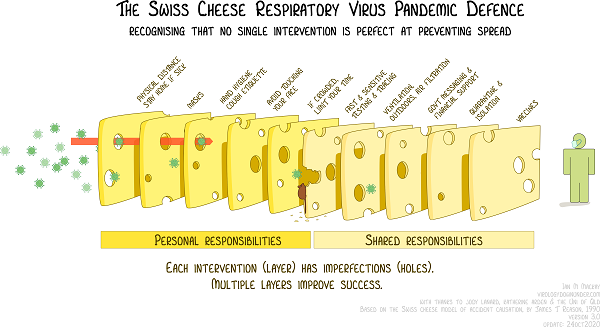By David Musyj
Since the start of COVID-19 Windsor Regional Hospital (WRH) has learned that we need to review the science and research and be able to make changes quickly and safely for the protection of patients, staff and our communities. From adapting to changes involving the appropriate personal protective equipment to clinical treatment of patients adapting to what we have learned over the last two years has saved lives of both patients and staff. In addition to adapting to changes we learned not one item in and of itself would protect our staff and community. We had to use a layered approach to protection from acquiring and/or spreading COVID-19.
Dr. Ian M. Mackay, a virologist at the University of Queensland, in Brisbane, Australia, created the “Swiss Cheese Respiratory Pandemic Defense”. Dr Mackay’s model made it clear not one single intervention is perfect at preventing spread of COVID-19 it takes multiple layers to improve the success of preventing the acquisition and spread of COVID-19. Some are personal responsibilities like wearing appropriate PPE, washing hands and staying home if sick. Others are shared responsibilities like vaccination, quarantine and isolation and border controls or stay at home orders. Two shared responsibilities that are also very important that sometimes are not focused on is fast and sensitive testing and appropriate air filtration and ventilation.

At WRH we have implemented a vaccine mandate for both staff and visitors with limited exceptions for visitors as a result of being an acute care facility with a trauma program. However, we have also recognized that vaccines do not have 100 per cent efficacy. Also, many of our staff are parents or guardians to children that were not or still not eligible for vaccinations.
While at home, parents are not wearing PPE with their children in their homes and as a result susceptible to acquiring COVID-19 and have limited symptoms as a result. This could result in a child returning to school and spreading COVID-19 to their class or the employee coming to work and doing the same to colleagues and patients. As a result, in August before school started we purchased rapid antigen test kits and provided them to staff for surveillance use at home. The fast testing referred to by Dr. Mackay. This has resulted in multiple “saves” to that has possibly avoided spread in our community, schools or hospital. WRH team members have shared their stories thanking the hospital team for making these rapid antigen test kits available to their family and avoiding even spread within their own household due to fast testing and “acting on the results”. Staff now use these test kits before they visit elderly loved ones or before they go to dinner with friends and family. Again, by itself the antigen test kits are not perfect at preventing spread. But added with other interventions it supports a defense to COVID-19.
Another intervention WRH added for its team members is carbon dioxide monitors (C02). During earlier waves it became evident at many healthcare institutions across the world that staff rooms and areas in which staff took breaks to eat or drink resulted in spread of COVID-19 between staff. We looked at limiting the number of persons in each room at any given time as well as tried various dividers between staff with social distancing. However, air ventilation and filtration was not fully known. The addition of C02 monitors in staff rooms allows for an objective measure of air ventilation that has been used by multiple countries across the world. The WRH staff are provided with written materials on the level of C02 to be aware of that is safe versus the level that indicates air circulation and ventilation is not adequate and objectively determines that the conditions are more favourable for COVID-19 to be spread. At the end of the day you still need a positive COVID-19 person in the room however this objective measurement adds another layer to preventing the spread of COVID-19.
Similar to the Swiss Cheese model that will continue to expand as we proceed through this pandemic WRH will continue to actively monitor the science and research and implement changes that protect our patients, staff and community.
David Musyj is President and CEO, Windsor Regional Hospital.


